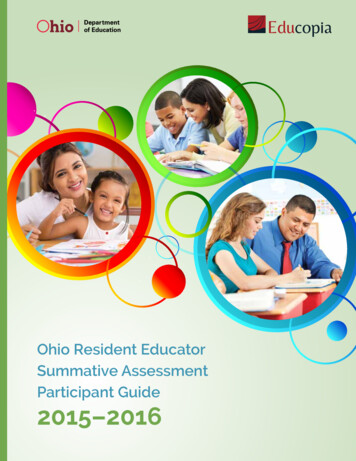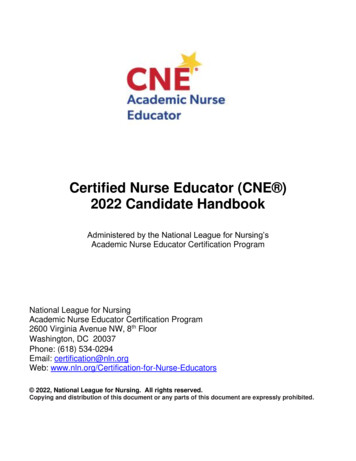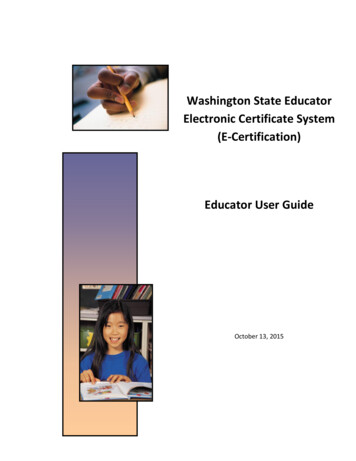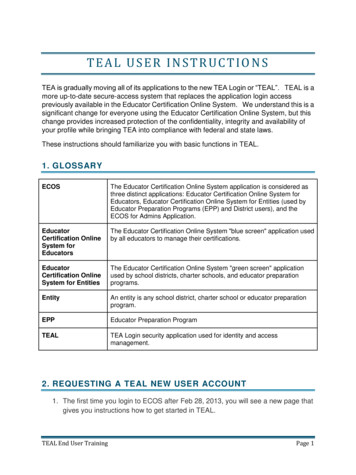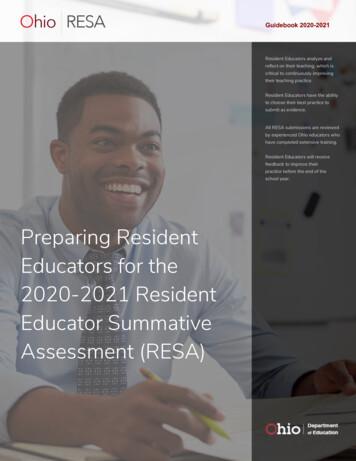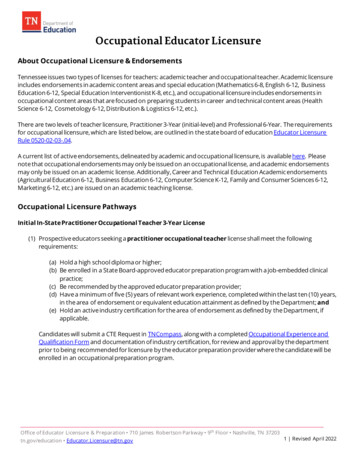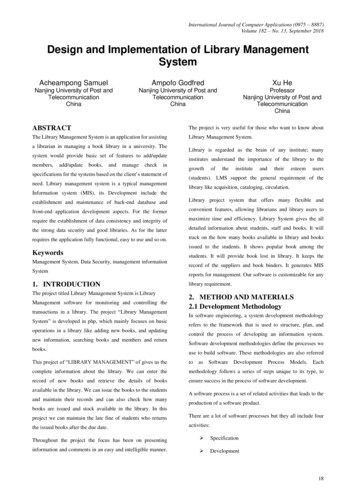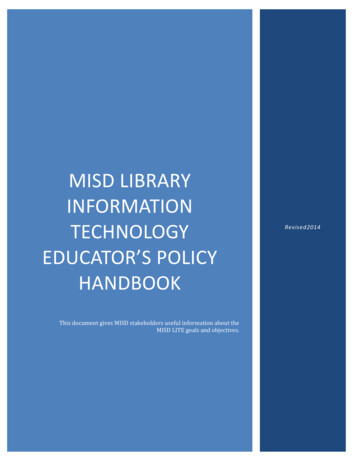
Transcription
MISD LIBRARYINFORMATIONTECHNOLOGYEDUCATOR’S POLICYHANDBOOKThis document gives MISD stakeholders useful information about theMISD LITE goals and objectives.[Type text]Revised2014
1The terms “Librarian” and “Library” are experiencing a transition in Mansfield ISD.These terms have been replaced with Library Information Technology Educator (LITE)”and “Library Learning Commons”. Other documents referenced use the term “Librarian”or “Library Media Specialist” and “Library” or “Library Media Center”.As you view this document, please keep in mind that while some of these documents areapproved policy by the MISD School Board, some are considered best practices forschool librarians and not Board Policy.This document was revised by a committee of Mansfield ISD Librarians under thesupervision of Christie Alfred. The committee members were:Jennifer Chen; Janet Brockett Elementary SchoolLesley Norris; Nancy Neal Elementary SchoolKayla Middleton; Lake Ridge High SchoolMISD LITE Policy Handbook Revised 2014
2Table of ContentsMISD Mission Statement3MISD Library Information Technology Educator’s Mission Statement3American Library Association Library Bill of Rights4American Library Association Code of Ethics5National Council of Teachers of English Students’ Right to Read6American Association of School LibrariansStandards for the 21st Century Learner8MISD Librarian’s Job Description12Library Learning Commons Hours14Conduct in the Library Learning Commons14Student Responsibility14Teacher Responsibility14LITE Responsibility14Circulation Procedures14Procedures for Donations15Selection of Materials15Request for Reconsideration16MISD School Board Policy on Instructional Materials16MISD School Board Policy on Copyrighted Materials16Request for Consideration of Materials16Works Cited17MISD LITE Policy Handbook Revised 2014
3Mansfield ISD Mission StatementMansfield Independent School District ensures educational and personal success by: Aspiring to high academic standardsFostering a community built on mutual support and excellenceDelivering innovative educational opportunitiesCultivating productive, lifelong learners.MISD Library Information Technology Educator’s (LITE)Mission StatementMISD Library Information Technology Educators (LITE) support the District missionto ensure educational and personal success by providing curriculum supportthrough partnerships that create innovative 21st Century learning opportunities.LITEs empower students to be effective and responsible users of ideas andinformation and enthusiastic readers.LITE’s Two Goals:1. All students and staff are effective and responsible users of ideas andinformation.2. All students are enthusiastic and critical readers.MISD LITE Policy Handbook Revised 2014
4American Library Association Library Bill of RightsThe American Library Association affirms that all libraries are forums forinformation and ideas, and that the following basic policies should guide theirservices.I. Books and other library resources should be provided for the interest,information, and enlightenment of all people of the community the library serves.Materials should not be excluded because of the origin, background, or views ofthose contributing to their creation.II. Libraries should provide materials and information presenting all points of viewon current and historical issues. Materials should not be proscribed or removedbecause of partisan or doctrinal disapproval.III. Libraries should challenge censorship in the fulfillment of their responsibility toprovide information and enlightenment.IV. Libraries should cooperate with all persons and groups concerned with resistingabridgment of free expression and free access to ideas.V. A person’s right to use a library should not be denied or abridged because oforigin, age, background, or views.VI. Libraries that make exhibit spaces and meeting rooms available to the publicthey serve should make such facilities available on an equitable basis, regardless ofthe beliefs or affiliations of individuals or groups requesting their use.MISD LITE Policy Handbook Revised 2014
5American Library Association Code of EthicsAs members of the American Library Association, we recognize the importance ofcodifying and making known to the profession and to the general public the ethicalprinciples that guide the work of librarians, other professionals providinginformation services, library trustees and library staffs.Ethical dilemmas occur when values are in conflict. The American LibraryAssociation Code of Ethics states the values to which we are committed, andembodies the ethical responsibilities of the profession in this changing informationenvironment.We significantly influence or control the selection, organization, preservation, anddissemination of information. In a political system grounded in an informedcitizenry, we are members of a profession explicitly committed to intellectualfreedom and the freedom of access to information. We have a special obligation toensure the free flow of information and ideas to present and future generations.The principles of this Code are expressed in broad statements to guide ethicaldecision making. These statements provide a framework; they cannot and do notdictate conduct to cover particular situations.I.II.III.IV.V.VI.VII.VIII.We provide the highest level of service to all library users throughappropriate and usefully organized resources; equitable service policies;equitable access; and accurate, unbiased, and courteous responses to allrequests.We uphold the principles of intellectual freedom and resist all efforts tocensor library resources.We protect each library user's right to privacy and confidentiality withrespect to information sought or received and resources consulted,borrowed, acquired or transmitted.We respect intellectual property rights and advocate balance between theinterests of information users and rights holders.We treat co‐workers and other colleagues with respect, fairness, and goodfaith, and advocate conditions of employment that safeguard the rights andwelfare of all employees of our institutions.We do not advance private interests at the expense of library users,colleagues, or our employing institutions.We distinguish between our personal convictions and professional dutiesand do not allow our personal beliefs to interfere with fair representation ofthe aims of our institutions or the provision of access to their informationresources.We strive for excellence in the profession by maintaining and enhancing ourown knowledge and skills, by encouraging the professional development ofco‐workers, and by fostering the aspirations of potential members of theprofession.MISD LITE Policy Handbook Revised 2014
6National Council of Teachers of English (NCTE)The Students’ Right to ReadThe right to read, like all rights guaranteed or implied within our constitutionaltradition, can be used wisely or foolishly. In many ways, education is an effort toimprove the quality of choices open to all students. But to deny the freedom ofchoice in fear that it may be unwisely used is to destroy the freedom itself. For thisreason, we respect the right of individuals to be selective in their own reading. Butfor the same reason, we oppose efforts of individuals or groups to limit the freedomof choice of others or to impose their own standards or tastes upon the communityat large.The right of any individual not just to read but to read whatever he or she wants toread is basic to a democratic society. This right is based on an assumption that theeducated possess judgment and understanding and can be trusted with thedetermination of their own actions. In effect, the reader is freed from the bonds ofchance. The reader is not limited by birth, geographic location, or time, sincereading allows meeting people, debating philosophies, and experiencing events farbeyond the narrow confines of an individual's own existence.In selecting books for reading by young people, English teachers consider thecontribution which each work may make to the education of the reader, its aestheticvalue, its honesty, its readability for a particular group of students, and its appeal toadolescents. English teachers, however, may use different works for differentpurposes. The criteria for choosing a work to be read by an entire class aresomewhat different from the criteria for choosing works to be read by small groups.For example, a teacher might select John Knowles' A Separate Peace for reading byan entire class, partly because the book has received wide critical recognition, partlybecause it is relatively short and will keep the attention of many slow readers, andpartly because it has proved popular with many students of widely differingabilities. The same teacher, faced with the responsibility of choosing orrecommending books for several small groups of students, might select orrecommend books as different as Nathaniel Hawthorne's The Scarlet Letter, JackSchaefer's Shane, Alexander Solzhenitsyn's One Day in the Life of Ivan Denisovitch,Pierre Boulle's The Bridge over the River Kwai, Charles Dickens' Great Expectations,or Paul Zindel's The Pigman, depending upon the abilities and interests of thestudents in each group.And the criteria for suggesting books to individuals or for recommending somethingworth reading for a student who casually stops by after class are different fromselecting material for a class or group. But the teacher selects, not censors, books.Selection implies that a teacher is free to choose this or that work, depending uponthe purpose to be achieved and the student or class in question, but a book selectedMISD LITE Policy Handbook Revised 2014
7this year may be ignored next year, and the reverse. Censorship implies that certainworks are not open to selection, this year or any year.Wallace Stevens once wrote, "Literature is the better part of life. To this it seemsinevitably necessary to add, provided life is the better part of literature." Studentsand parents have the right to demand that education today keep students in touchwith the reality of the world outside the classroom. Much of classic literature asksquestions as valid and significant today as when the literature first appeared,questions like "What is the nature of humanity?" "Why do people praiseindividuality and practice conformity?" "What do people need for a good life?" and"What is the nature of the good person?" But youth is the age of revolt. To pretendotherwise is to ignore a reality made clear to young people and adults alike ontelevision and radio, in newspapers and magazines. English teachers must be free toemploy books, classic or contemporary, which do not lie to the young about theperilous but wondrous times we live in, books which talk of the fears, hopes, joys,and frustrations people experience, books about people not only as they are but asthey can be. English teachers forced through the pressures of censorship to use onlysafe or antiseptic works are placed in the morally and intellectually untenableposition of lying to their students about the nature and condition of mankind.The teacher must exercise care to select or recommend works for class reading andgroup discussion. One of the most important responsibilities of the English teacheris developing rapport and respect among students. Respect for the uniqueness andpotential of the individual, an important facet of the study of literature, should beemphasized in the English class. Literature classes should reflect the culturalcontributions of many minority groups in the United States, just as they shouldacquaint students with contributions from the peoples of Asia, Africa, and LatinAmerica.MISD LITE Policy Handbook Revised 2014
8American Association of School Librarians Standards forthe 21st Century LearnerAdopted 2007Standard I. Learner‐Centered Teaching and LearningGoal: To promote the integration of curriculum, resources, and teachingstrategies to ensure the success of all students as the effective creators and usersof ideas and information, enabling them to become lifelong learners.Principle 1.The librarian models and promotes collaborative instruction withteachers, as determined by the independent and diverse needs of alllearners, and within the context of state curriculum standards.Principle 2.The librarian works collaboratively with students, teachers, and thecommunity to promote local, state, and national reading initiativesthat encourage learners to read, write, view, speak, and listen forunderstanding and enjoyment.Principle 3.The librarian collaborates, designs, and provides ongoing instructionfor staff and students in the integration of information technologyand information literacy, emphasizing and modeling the ethical useof resources.Standard II. Learner‐Centered Program Leadership and ManagementGoal: To demonstrate effective school library program leadership andmanagement throughout the school, the district, and in local, state, and nationalactivities and associations.Principle 1.Planning: As an advocate for libraries, the librarian leads in thedevelopment and implementation of a library vision, mission, goals,objectives, and strategic plan that incorporate sound policies andpractices.Principle 2.Organizing and Staffing: The librarian manages staff, volunteers, andpartners to support the curriculum, to satisfy learners’ diverse needs,and to encourage lifelong learning.Principle 3.Budgets/Funding: The librarian advocates for funding and managesschool library program budgets to build and maintain a programwith resources and services that support a curriculum designed todevelop information‐literate students who achieve success in theclassroom and function effectively in the community.Principle 4.Research/Assessment/Reporting: The librarian manages a successfulprogram by demonstrating the value of the library program throughresearch, data collection, assessment, evaluation, and disseminationof information about services and resources.MISD LITE Policy Handbook Revised 2014
9Standard III. Learner‐Centered Technology and Information AccessGoal: To promote the success of all students and staff by facilitating the access,use, and integration of technology, telecommunications, and informationsystems to enrich the curriculum and enhance learning.Principle 1.The library media program provides a balanced, carefully selected,and systematically organized collection of print and electronic libraryresources that are sufficient to meet students’ needs in all subjectareas and that are continuously monitored for currency andrelevancy.Principle 2.The librarian models and promotes the highest standards of conduct,ethics, and integrity in the use of the Web and other print andelectronic resources.Principle 3.The librarian employs existing and emerging technologies to access,evaluate, and disseminate information for integration intoinstructional programs.Principle 4.The librarian models information problem solving processes whileproviding formal and informal instruction about reference andresearch techniques.Standard IV. Learner‐Centered Library EnvironmentGoal: To provide design guidelines for facilities to allow for manipulation,production, and communication of information by all members of the learningcommunity.Principle 1.The design of the school library is aligned with the educationalobjectives of the learning community. The library environment isdesigned for flexible access and supports all educational objectives ofthe library program. Educational specifications for any renovation orproposed new facility will include a description of the proposedproject expressing the range of issues and alternatives, in accordancewith 19 TAC 61.1036, School Facilities Standards for Construction onor after January 1, 2004, Subchapter CC, Commissioner’s RulesConcerning School Facilities.Principle 2.The library is designed to serve as a flexible, functional, and barrier‐free simultaneous‐use facility for individuals, small groups, andclasses as described by state and federal guidelines. The library isalso designed to maximize the use of available space to permitdisplays of student, faculty, and community‐produced materials, andcollections. The facility provides all members of the learningcommunity opportunities to explore and meet their information andrecreational needs during and beyond the school day. The libraryprovides an exemplary level of safety, security, and an age‐appropriate facility for all individuals, small groups, and classes.MISD LITE Policy Handbook Revised 2014
10Standard V. Learner‐Centered Connections to CommunityGoal: To provide information equity by working for universal literacy; defendingintellectual freedom; preserving and making accessible the human record;ensuring access to print and electronic resources; connecting school faculty,staff, and students to community resources and services as needed; and byconnecting community members to school resources and services asappropriate.Principle 1.The librarian develops a school library program that offers students,faculty, and staff, families, partners, and community constituentsopportunities for participation and collaboration in the library andeducational community. The librarian promotes/encourages broadschool and community‐based advocacy for the school libraryprogram to support student success.Principle 2.The librarian facilitates broad access to library resources andprovides opportunities for use for students, faculty and staff, families,partners, and community constituents.Principle 3.The librarian is knowledgeable about learning differences andethnically and culturally diverse interests of the school and localcommunity and develops a school library program that responds tothese unique community characteristics.Principle 4.The librarian, in partnership with community organizations,develops, maintains, and markets the vision, goals, and needs of theschool library program to the broadest community constituency topromote the library and student success.Standard VI. Learner‐Centered Information Science and LibrarianshipGoal: To promote the success of all students and staff by: providing informationequity; working for universal literacy; defending intellectual freedom;preserving and making accessible the heritage of all cultures; and ensuring thatequal access to resources in all formats is available for everyone.Principle 1.The librarian works collaboratively with other informationprofessionals in support of the library program, studentachievement, and the profession, and understands the role of alltypes of libraries in an integrated learning environment.Principle 2.The librarian creates a school library program that is recognized asthe central element in the intellectual life of the school as evidencedby use of statistical measures to evaluate and improve the program.Principle 3.The librarian applies and implements the principles and concepts ofcollection development: evaluation, selection, acquisition, andorganization of information, and employs standard bibliographic andretrieval techniques.Principle 4. The librarian evaluates and selects existing and emergenttechnologies to support the library program in coordination with theMISD LITE Policy Handbook Revised 2014
11Standard VI (con’d)Texas Education Agency’s Long‐Range Plan for Technology and thecampus STaR Chart.Principle 5.The librarian communicates effectively with students and staff todetermine information needs and applies knowledge of literature toguide development of independent readers.Principle 6.The librarian demonstrates ethical behavior and promotes theprinciples of intellectual freedom, information access, privacy, andproprietary rights.Principle 7.The librarian engages in continuous self‐evaluation and self‐directedlearning for professional growth by participating in and contributingto professional associations and publications.MISD LITE Policy Handbook Revised 2014
12MISD Librarian (LITE) Job DescriptionMajor Responsibilities and Duties:Instruction:1. Provide group instruction and individual guidance to students to help themlocate resources and use research techniques.2. Consult teachers on appropriate use of materials and help them schedulematerials for classroom instruction.3. Serve as information resource for users of library/media center materialsand provide staff development opportunities for teachers on the availabilityand use of campus and district learning resources.Library Programs:4. Effectively plan school library program to meet identified needs.5. Assist in preparation of bibliographies and curriculum guides.6. Manage acquisitions, processing, organizing, distribution, maintenance,and inventory of resources.7. Coordinate development and maintenance of community resource file.8. Maintain schedules for instructional television programs and encourage useof video programs for educational purposes.9. Create a library/media center environment that is conducive to learning andappropriate to the maturity level and interests of students.10. Use appropriate and effective techniques to encourage community andparent involvement.Student Management:11. Carry out discipline in accordance with board policies and administrativeregulations.12. Interact with students to promote positive attitudes toward life‐longlearning.Administration:13. Compile, budget and cost estimates based on documented program needs.14. Compile, maintain, and file all physical and computerized reports, records,and other documents required.15. Comply with federal and state laws, State Board of Education rule, and boardpolicy in the library/media services area.16. Develop and coordinate a continuing evaluation of the library/media centerprogram and make changes based on the findings.17. Comply with all district and campus routines and regulations.Communication:18. Maintain a positive and effective relationship with supervisors.19. Communicate effectively with colleagues, students, and parents.20. Other duties as assigned.Supervisory Responsibilities:21. Supervise clerical aide(s), student aides, and volunteers.MISD LITE Policy Handbook Revised 2014
13Working Conditions:Mental Demands/Physical Demands/Environmental Factors:Maintain emotional control under stress. Climbing, stretching, frequent light liftingof books, boxes.MISD LITE Policy Handbook Revised 2014
14Library Learning Commons HoursThe Library Learning Commons should remain open to serve students and staffduring regular school hours. These hours should be posted in a prominent place atthe entrance of the Library Learning Commons; including information about LibraryLearning Commons hours in student and staff orientations and, if possible, in theschool policy manual.Conduct in the Library Learning CommonsIn order to maintain an atmosphere conducive to learning and enjoyment, thefollowing guidelines for conduct in the Library Learning Commons should befollowed:Student Responsibility1. Each student is expected to comply with rules and expectation of the LibraryLearning Commons in order to maintain an atmosphere conducive tolearning.2. Non‐compliance will result in consequences consistent with the campusdiscipline plan. As a last resort, a student may be suspended from theLibrary Learning Commons for persistent misbehavior.Teacher Responsibility1. The teacher is to remain with his/her classes during checkout, informationskill lessons, and/or when students are involved with research activities.2. The teacher will be responsible for maintaining the discipline of his/her classwhile in the Library Learning Commons.Library Information Technology Educator Responsibility1. The LITE is responsible for ensuring that an atmosphere conducive tolearning is maintained.2. When a teacher is not maintaining discipline, the LITE should intervene torestore a proper atmosphere.3. Each campus LITE should present the rules and expectations of the LibraryLearning Commons to the students.Circulation ProceduresSee individual campus websites for circulation policies and procedures.MISD LITE Policy Handbook Revised 2014
15Procedures for DonationsGifts, Memorials, or Cash DonationsBooks, other materials, or cash donations, may be received as gifts provided theymeet the school library selection standards. They are accepted with theunderstanding that, if not suitable, they may be disposed of at the discretion of theLITE. It is preferred that the LITE selects books, or other materials for gifts ormemorials. Groups wishing to purchase material may request that the LITE providea list from which selection may be made.Selection of MaterialsThe LITE, with the support and the assistance of the faculty, is responsible for theselection of resource materials. These materials should implement, support, andenrich the educational programs of the Mansfield ISD schools. The LITE must have athorough knowledge of the student body, the strengths and weaknesses of thecollection and must consider both curriculum needs, as well as needs of the faculty,in selecting materials.The following criteria should be considered when selecting new materials:1. Curriculum2. Literary and artistic quality of the item3. Authority4. Publication or production date5. Appropriateness of level for intended user6. Appropriateness of format7. Overall appeal8. Value commensurate with cost9. Balanced viewpoint10. Favorable review sources (if available)The selection of materials and equipment is a primary responsibility that should beassumed with care and judgment. The LITE is guided by the principals for selectionand reconsideration of materials established in the Mansfield ISD Board PolicyManual, EFA (Local) that is excerpted in the section.MISD LITE Policy Handbook Revised 2014
16Board Policy on Instructional ResourcesMansfield ISD Board Policy Manual EFA (Exhibit A & B)Board Policy on Copyrighted MaterialMansfield ISD Board Policy on CopyrightRequest for Reconsideration of MaterialsMISD LITE’s use their training, the MISD Board Policy, Campus Plan, and the TEKS toselect materials for their individual campus. If you have a concern about aparticular item found in the Library Learning Commons, the following procedure issuggested. Read the item of concern in its entirety making notations of specific areas ofconcern.Schedule an appointment to discuss these concerns with the school librarian.Once these steps are completed, if there is still concern, please schedule anappointment with the building principal.If, after these steps have been taken, there is still concern, please completethe steps found on the MISD Board Policy to Request Reconsideration ofInstructional Materials.MISD LITE Policy Handbook Revised 2014
17Works Cited"Code of Ethics of the American Library Association." American Library Association.N.p., n.d. Web. 6 Feb. 2014. /codeethics ."Library Bill of Rights." American Library Association. N.p., n.d. Web. 5 Feb. 2014. http://www.ala.org/advocacy/intfreedom/librarybill .Standards for the 21st century learner. Chicago: American Association of SchoolLibrarians, 2007. Print."The Students' Right to Read." NCTE Comprehensive News. N.p., n.d. Web. 6 Feb. 2014. adguideline .MISD LITE Policy Handbook Revised 2014
MISD Library Information Technology Educators (LITE) support the District mission to ensure educational and personal success by providing curriculum support through partnerships that create innovative 21st Century learning opportunities. LITEs empower students to be effective and responsible users of ideas and

